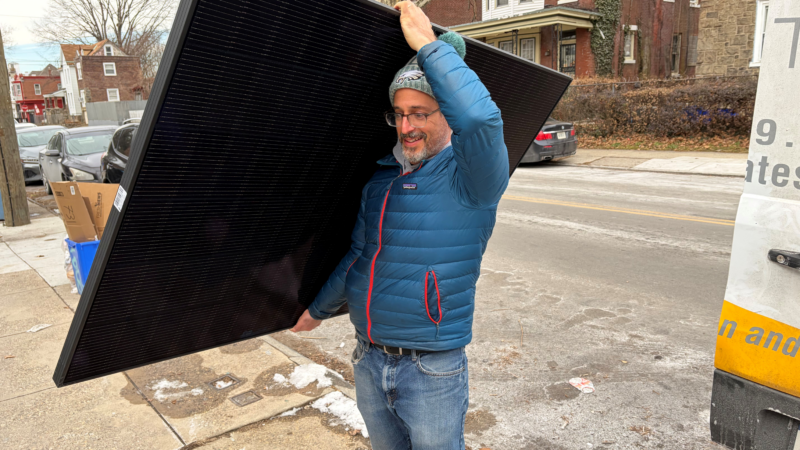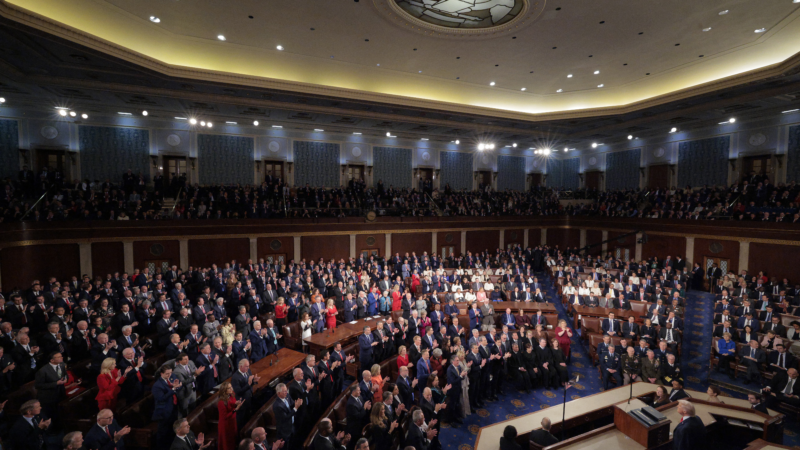Sen. Tim Kaine says Trump’s tariffs could reduce federal debt, but at what cost?
The Congressional Budget Office says President Trump’s tariffs could raise $2.8 trillion over the next decade — if they stay in place. But Sen. Tim Kaine, D-Va., argues that the cost of raising so much money would fall onto poor families and middle class Americans.
“Basically what the tariff revenue is doing, it’s being used to finance a huge tax cut for the wealthiest, together with cuts in everyday programs that people rely on like Medicaid and nutrition assistance,” Kaine told Morning Edition.
Since Trump’s return to the White House, he has imposed taxes of 10 to 50% on nearly everything the U.S. imports, and those taxes have already raised tens of billions of dollars in revenue.
If the tariffs remain in place, they’re expected to reduce the federal deficit by $2.8 trillion by 2035, according to a CBO letter released Wednesday. The money would also offset the cost of the sweeping budget bill passed by the House last month.
“The distributional effect of tariffs, because it’s a sales tax and economists have long said sales taxes are regressive, they hit low and middle income people much harder than upper income people,” Kaine, who sits on the Senate Budget Committee, said.
“Is it fair to reduce the deficit off the backs of everyday folks rather than make the wealthiest carry a fair share,” he added.
Kaine further discussed his concerns over the effects of tariffs and their projected impact on the budget deficit with NPR’s Steve Inskeep.
The following interview has been lightly edited for length and clarity.
Interview highlights
Steve Inskeep: You have been concerned about the budget deficit, the amount that we borrow every year, the federal debt, the amount of borrowing or debt that accumulates over time. According to the CBO, the tariffs would reduce the deficit. Is that useful even if you dislike tariffs?
Sen. Tim Kaine: Steve, you’ve described one piece of the puzzle. The CBO said this Trump tariff regime, which is essentially a sales tax, is going to raise a lot of revenue. And that raising of revenue will do three things. It will reduce the deficit. It will raise costs on everyday Americans for groceries and building supplies, home supplies [and] clothes. And it will also shrink the economy. But it’s not the only piece of the puzzle, because basically what the tariff revenue is doing, it’s being used to finance a huge tax cut for the wealthiest, together with cuts in everyday programs that people rely on like Medicaid and nutrition assistance.
Inskeep: So, it would pay down federal debt, but it would cause someone making $70,000 or $50,000 a year to pay it rather than somebody making $70 million or $50 million. Is that what you’re saying?
Kaine: Absolutely. The distributional effect of tariffs, because it’s a sales tax and economists have long said sales taxes are regressive, they hit low and middle income people much harder than upper income people. Because lower and middle income people spend more of their income on purchasing things rather than socking it away in savings or the stock market. Is it fair to reduce the deficit off the backs of everyday folks rather than make the wealthiest carry a fair share? So, again, the piece of the puzzle, reduce deficit, sure. But raise costs on everyday people and shrink the economy. Is it worth it? You add to it this reduction of all the key programs people rely on this reconciliation bill. And now you see Donald Trump is trying to do and turn to what he did in term one, a tax break that benefits the wealthiest at the expense of everybody else.
Inskeep: I have to ask you about this other news, the break up at the White House. President Trump and Elon Musk very publicly breaking up just after Elon Musk left government service. What do you make of this?
Kaine: Well, you know, no surprise, but surprise. So, I think anybody who kind of is aware of the personalities of these two individuals would have predicted the breakup. […] Musk is concerned about some features of this bill, the deficit effect of the reconciliation.And so there are many things about this bill that caused grave concern. And that’s why the House product is taking on an awful lot of water in the Senate. And if the Senate does pass this back to the House, I think it’s going to be in dramatically different form.
Inskeep: Dramatically different form, meaning lower deficits, among other things?
Kaine: For my sake, I’m going to try to offer amendments and say, ‘Hey, if you don’t extend deep estate tax cuts for the wealthiest, you don’t have to cut food assistance to poor families. So, everybody in the chamber, let’s vote on that.’ We’re going to put up amendments like that. And I think some of these amendments would be pretty darn salient.
Destinee Adams produced this piece for web, and Treye Green edited it. Nia Dumas and Taylor Haney produced the audio story.
Transcript:
STEVE INSKEEP, HOST:
Senator Tim Kaine, a Democrat from Virginia, joins us next. He’s on the Senate Budget Committee. Senator, welcome back.
TIM KAINE: Steve, good to be with you.
INSKEEP: OK. So I want to note for people who don’t know, you have been concerned about the budget deficit, the amount that we borrow every year, the federal debt, the amount of borrowing or debt that accumulates over time. According to the CBO, the tariffs would reduce the deficit. Is that useful, even if you dislike tariffs?
KAINE: Steve, you’ve described one piece of the puzzle. The CBO said this Trump tariff regime, which is essentially a sales tax, as the previous guest described, is going to raise a lot of revenue, and that raising of revenue will do three things – it will reduce the deficit, it will raise costs on everyday Americans for groceries and building supplies, home supplies, clothes, and it will also shrink the economy. So if that was the only piece of the puzzle, of course, we’d be talking about, should we be shrinking the economy to reduce the deficit? Should we be reducing the deficit off the backs of everyday people rather than, you know, the wealthy? But it’s not the only piece of the puzzle because basically what the tariff revenue is doing, it’s being used to finance a huge tax cut for the wealthiest, together with cuts in everyday programs that people rely on like Medicaid and nutrition assistance.
INSKEEP: So it would pay down federal debt, but it would cause someone making 70,000 or 50,000 a year to pay it rather than somebody making 70 million or 50 million. Is that what you’re saying?
KAINE: Absolutely. The distributional effect of tariffs, because it’s a sales tax, and economists have long said, sales taxes are regressive. They hit low- and middle-income people much harder than upper-income people because lower- and middle-income people spend more of their income on purchasing things, rather than, you know, socking it away in savings or the stock market. So yeah, is it fair to reduce the deficit off the backs of everyday folks rather than make, you know, the wealthiest carry a fair share? So, again, the piece of the puzzle, reduce deficit, sure, but raise costs on everyday people and shrink the economy. Is it worth it? You add to it this reduction of all the key programs people rely on, this reconciliation bill. And now you see Donald Trump’s trying to do in term two what he did in term one, a tax break that benefits the wealthiest at the expense of everybody else.
INSKEEP: Understood. I have to ask you about this other news – the breakup at the White House. President Trump and Elon Musk very publicly breaking up just after Elon Musk left government service. What do you make of this?
KAINE: Well, you know, no surprise, but surprise. So I think anybody who kind of is aware of the personalities of these two individuals would have predicted the breakup. But some of the way it’s breaking up, some of the ferocity of Musk’s comments. I mean, he was just, you know, given a golden key to the White House, I think it was last week. And then all of a sudden, it’s all turned bad. You know, Musk is concerned about some features of this bill, the deficit effect of the reconciliation. You’ve had my Senate colleague, Ron Johnson, on talking about the same thing.
INSKEEP: Sure.
KAINE: And so there are many things about this bill that cause grave concern, and that’s why the House product is taking on an awful lot of water in the Senate. And if the Senate does pass this back to the House, I think it’s going to be in dramatically different form.
INSKEEP: Dramatically different form, meaning lower deficits, among other things?
KAINE: Well, I tell you, on – for my sake, what I’m going to try to do is I’m going to try to offer amendments and say – here would be an example – hey, if you don’t extend deep estate tax cuts for the wealthiest, you don’t have to cut food assistance to poor families. Now, so everybody in the chamber, let’s vote on that. Why give estate tax relief to the wealthiest to take food away from families – poor families and kids? We’re going to put up amendments like that. And I think some of these amendments will be pretty darn salient. And then you’ll see Ron Johnson putting up amendment to reduce the deficit. I mean, there’s going to be all kinds of proposals to change this bill.
INSKEEP: One other thing – very briefly – the president yesterday threatened to take away Elon Musk’s contracts. We don’t know if that’s going to happen. Maybe they’ll make up. Who knows? But he made the threat. Is that an appropriate use of presidential power?
KAINE: Well, I think most of what President Trump is doing, unilateral threats, not a good use of presidential power. And just back to tariffs, I’m starting tariffs. I’m delaying them. I may give you a waiver. I may give you an exception. The point you made about unpredictability is keeping a lot of Virginia companies on the sidelines who want to make investments, but they’re not going to make investments till things settle down. Will they settle down under a President Trump? I think you got to really wonder about that.
INSKEEP: Senator Tim Kaine of Virginia, it’s a pleasure. Thank you, sir.
KAINE: Glad to be with you, Steve.
INSKEEP: Take care.
When a horse whinnies, there’s more than meets the ear
A new study finds that horse whinnies are made of both a high and a low frequency, generated by different parts of the vocal tract. The two-tone sound may help horses convey more complex information.
Hundreds of American nurses choose Canada over the U.S. under Trump
More than 1,000 American nurses have successfully applied for licensure in British Columbia since April, a massive increase over prior years.
Trump’s many tariff tools mean consumer prices won’t go down, analysts say
The Supreme Court struck down President Trump's signature tariffs. But the president has other tariff tools, and consumers shouldn't expect cheaper prices anytime soon, economists say.
Tax credits for solar panels are available, but the catch is you can’t own them
Rooftop solar installers are steering customers toward leases instead of purchases. Federal tax credits for purchased systems have ended but are still available for leased ones.
5 takeaways from Trump’s State of the Union address
President Trump hit familiar notes on immigration and culture in his speech Tuesday night, but he largely underplayed the economic problems that voters say they are most concerned about.
China restricts exports to 40 Japanese entities with ties to military
China on Tuesday restricted exports to 40 Japanese entities it says are contributing to Japan's "remilitarization," in the latest escalation of tensions with Tokyo.







